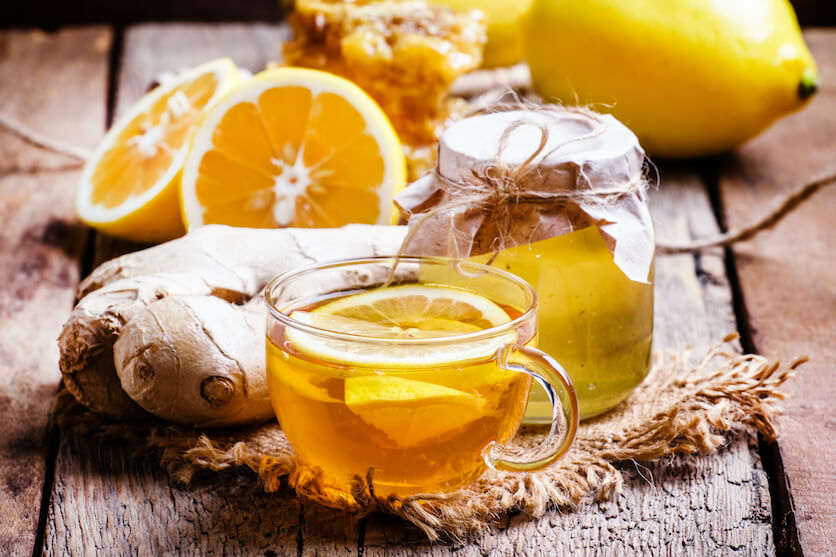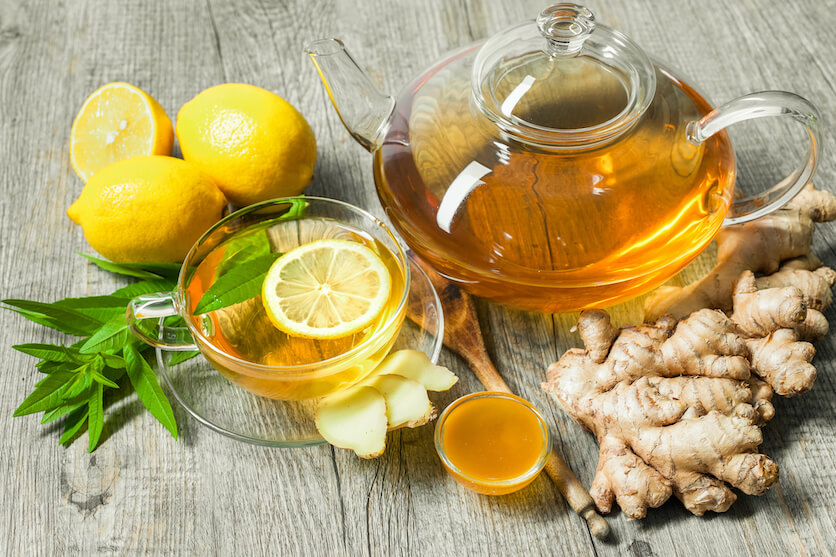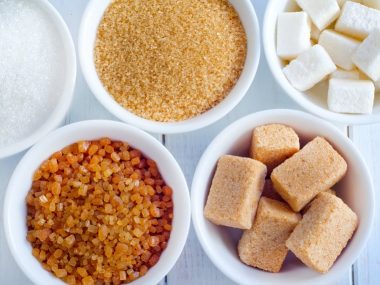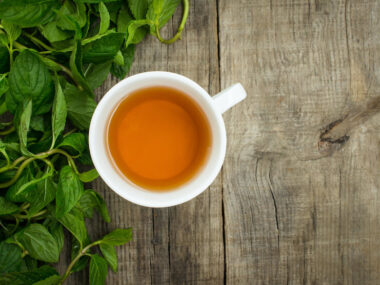As that scratchy feeling starts at the back of the throat, a sense of dread sets in. There’s an arsenal you can tap into to head off misery. Are you ready to find out what is the best tea for a sore throat?
Table of Contents
What Type Of Tea Is Best For A Sore Throat?
Black and green teas are nutritional powerhouses that fuel our bodies with immune boosters, antioxidants, and more. Pair those elements with the intake of fluids, and you have some of nature’s best home remedies to help heal and soothe a sore throat.
In addition to black and green tea, some tisanes are widely consumed by those seeking a natural remedy to help a sore throat. Tisanes are herbal teas and not considered a true tea. To qualify as a true tea, the tea must come from the tea plant (Camellia sinensis.) Herbal teas are made from other plants (or parts of a plant) and are typically consumed for medicinal purposes. Eastern (Chinese) medicine and ayurvedic practitioners prescribe tisanes (herbal teas) to treat various ailments.
Why Does Tea Help A Sore Throat?
When we visit our healthcare provider at the onset of illness, one of the first things we are instructed to do is drink plenty of fluids. The same principle applies to a sore throat. The hydrating effect that tea (and tisanes) provide our bodies helps to soothe.
Inflamed throat tissues are calmed with liquid as it washes over and coats them. Beneficial components within the tea (or tisane) provide relief of pain, help to quell a cough, cuts through phlegm and mucus from postnasal drip or congestion, and aids in healing.
What Drink Helps A Sore Throat?
Tea and saltwater are perhaps the two leading drinks that help ease sore throats. Both are soothing and healing. However, the very thing that sets them apart is taste. We can achieve the same results of gargling salt water by drinking a comforting warm or cold cup of tea (or tisane.)
Popsicles are another “go-to” method of trying to relieve the pain and inflammation of a sore throat. Did you know that you can enjoy a healthier alternative to sugary popsicles by making tea popsicles or drinking a nice tea slushy? Frozen tea provides numerous benefits that popsicles are unable to deliver.
Best Teas For Sore Throat

We do not have the medical expertise to make any recommendations on the use of tea or herbal products (tisanes) for the treatment of any medical or health condition. What we can do is provide you with evidence-based information on a specific tea or tisane and its direct relation to helping a sore throat.
It’s always best to consult with your healthcare provider before consuming tea or tisanes for ailments of the throat. Various conditions such as tonsillitis, strep throat, mononucleosis, and other infections or diseases require careful monitoring, diagnosis, and treatment by a physician, all of which should never be replaced by tea or tisanes.
So, what are the different types of tea good for sore throat?
1. Honey-Lemon Tea
Lemon and honey tea for sore throat is perhaps the leading tea used by those who not only have a sore throat but other conditions such as colds, flu, upper respiratory infection, and more. This tea typically has a base of black or green tea, which is brewed and served with fresh lemon slices and honey.
2. Turmeric Tea
Turmeric is well known for its anti-inflammatory benefits. What better way to help alleviate inflamed tonsils and lymph nodes? Turmeric tea varies in ingredients. When purchasing this tea from a retailer, it may be infused into a black tea or combined with other herbs as a tisane (herbal tea.)
Turmeric does nothing as a standalone herb because our body cannot process it. For it to be effective as a standalone tisane, you’ll need to add black pepper. Keep this in mind when purchasing turmeric tea. If the ingredients solely contain turmeric, you’ll need to add black pepper for it to help that sore throat.
3. Clove Tea
Clove tea varies in ingredients and how it’s enjoyed. If you purchase clove tea, it’s usually black tea-based with clove essential oil infusion. Clove tea can also be made by brewing black tea with whole cloves.
4. Ginger Tea
Ginger tea can contain various ingredients and may be prepared differently. Many tea drinkers add freshly ground ginger to black or green tea during brewing. Fresh lemon may also be included as an added benefit. Lastly, a standalone ginger tisane (herbal tea) may be enjoyed with ginger and perhaps lemon.
5. Green Tea
Green tea provides soothing hydration for a painful, swollen throat. Tea drinkers enjoy green tea as a standalone tea, either hot or cold or infused with essential oils, herbs, fruit, or blended with other teas.
Benefits Of Tea For Sore Throat and Cough

The five teas we have outlined above have numerous reported benefits as they relate to a sore throat. Below are research study results for each of the specific five teas. The evidence-based data speaks for itself.
Honey-Lemon Tea Benefits
A research study done by the Pacific College of Health & Science reports that polyphenols, catechins, and theaflavins in tea are oral bacteria growth inhibitors. These tea constituents fight strep throat. Additionally, a study done by the University of Shizuoka’s Department of Drug Evaluation & Informatics, Pharmaceutical Sciences, purports that the simple act of gargling with green or black tea helps to ward off viruses and the flu.
The “Honey and Health: A Review of Recent Clinical Research” research study published information on the medicinal benefits that honey exerts. Specifically, honey’s anti-inflammatory, antibacterial, and antimicrobial properties not only alleviate symptoms of a sore throat but promote healing.
Drinking honey lemon tea for sore throat has the added benefit of supplying a weakened immune system with that boost of Vitamin C.
Turmeric Tea Benefits
Turmeric is a spice that contains curcuminoids. Curcuminoids help to reduce/alleviate inflammation. Researchers released the results of a study (Curcumin: A Review of Its’ Effects on Human Health) which contained the various benefits of turmeric. The study went on to note that turmeric offers no health benefit when consumed alone. The human body cannot absorb it, nor can it be metabolized. Instead, it is quickly eliminated.
By adding black pepper to turmeric, the body is able to process it. Piperine (a constituent in black pepper) increases the bioavailability of turmeric by 2000%. The study goes on to report that the FDA lists turmeric as “Generally Recognized As Safe” at doses up to 12,000 mg per day.
Clove Tea Benefits
Researchers for the study “Syzygium aromaticum L. (Myrtaceae): Traditional Uses, Bioactive Chemical Constituents, Pharmacological and Toxicological Activities” (a scientific journal published by Multidisciplinary Digital Publishing Institute) documented their findings on how clove essential oil had beneficial effects on various conditions and diseases. Cloves have anti-inflammatory, analgesic, and antimicrobial effects. Additionally, cloves act as a decongestant and expectorant.
The FDA (Food and Drug Administration) noted in the study as “confirming” the safety of the intake of clove buds and clove essential oil. The study goes on to note that the World Health Organization’s recommended daily intake of cloves should be “2.5mg/kg total body weight.” To give you an idea of just how much that recommended daily intake of cloves would be for the average adult, it would equate to about 170 mg daily for a 150 lb. person.
Ginger Tea Benefits
The National Health Institute published an article (Herbal Medicine: Biomolecular and Clinical Aspects) attributing ginger’s anti-inflammatory and analgesic effect. Ginger has been a major herb used in traditional medicine to treat colds and associated symptoms. Drinking ginger tea for sore throat appears to have great benefits.
Green Tea Benefits
The “Beneficial Effects of Green Tea: A Literature Review” study published its findings on just how beneficial green tea is. The study reports that green tea has antiviral benefits for viruses such as adenovirus and flu that typically has associated pharyngitis. It has also been attributed to having anti-inflammatory and antibacterial benefits.
Tea Recipes For Sore Throat

We have a few tea recipes to help ease the discomfort of a sore throat.
Soothing Honey-Lemon Tea
Ingredients:
- 2 cups of water
- 1 teaspoon of loose-leaf black or green tea of your choice
- 1 slice of fresh lemon
- 1 ½ teaspoons of raw honey (locally-produced)
Directions:
- Bring the water to a boil.
- Place the loose leaf tea into a tea infuser.
- Drop the filled infuser and slice of lemon into the hot water and allow to steep for 5 minutes while covered.
- Remove the infuser and lemon slice.
- Pour the tea into a teacup and add the honey.
- Slowly sip to allow the tea and honey to coat the throat.
Ginger & Clove Tea Popsicle
Ingredients:
- 4 cups of water
- 4 teaspoons of loose-leaf black or green tea of your choice.
- ½ teaspoon of clove essential oil (or 1 tablespoon of whole cloves)
- ½ teaspoon of freshly grated ginger (or ½ teaspoon of ground ginger)
You will also need a popsicle tray and popsicle sticks.
Directions:
- Bring the water to a boil.
- Place the loose leaf tea into a tea infuser.
- Drop the tea infuser into the hot water.
- Add clove oil and ginger to the hot water.
- Cover and allow to steep for 10 minutes.
- Uncover and remove the tea infuser.
- Strain the tea mixture to remove the remaining ginger or whole cloves if used.
- Allow the tea to cool down to remove temperature.
- Pour into a popsicle tray and freeze.
- Enjoy as needed to soothe a sore throat.
Nature’s Remedy, Or Not?
Now that we have provided you with solid evidence on just how tea can benefit a sore throat, you can choose whether to partake of a natural means to help or not. Consuming a true tea (black or green) or herb tea for sore throat certainly seems to be of some benefit.






